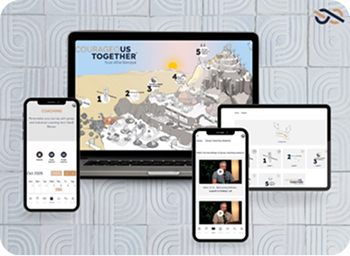
Q&A with Geoff: How do I tolerate my loved one’s uninformed political beliefs?
Question
How can I stop my negative feelings toward family/friends/acquaintances when our political beliefs differ? I want to accept their opinions as their right despite our differences and not just think they’re stupid and uninformed.
Answer
I appreciate your curiosity about how to eliminate your negative feelings so you can stay in a relationship with others whose views differ from yours. It’s certainly not always easy interacting with others who have beliefs and viewpoints that collide with ours. It takes courage to stay in the tension instead of silencing everyone with whom you disagree. Let’s talk about how you can practice this.
When dealing with serious differences, it’s easy to narrow our view and lose perspective. When we prioritize ideas over people, we run the risk of disconnecting from our shared humanity. This disconnection can generate more fear, resentment, hatred and even violence. I’m not suggesting we immediately abandon our ideas. Instead, our job is to learn how to live in the tension of opposing ideas while honoring our common humanity.
In other words, we can hold space for another person’s views the same way we hope someone would hold space for our views. When we value other people’s right to believe things we might see as incorrect, biased, or uninformed, we also create the same space for ourselves.
Your loved ones and acquaintances likely think similar things about your position, so this affords everyone the space to believe and embrace their own perspectives. Acceptance isn’t the same as agreement. There’s an essential humility in this approach that accepts their right to hold opposing views even though you don’t agree with them.
Terry Warner and his associates with the Arbinger Institute have written extensively on this challenging topic. Their body of work teaches that when we’re stuck in conflict with others, we have a tendency to dehumanize the other person or group. We get locked into an “I / it” view of others instead of “I / you” view, which preserves their humanity.
Instead of seeing others as objects we need to work around, we see others as deserving of the same respect we are giving our own viewpoints. Some of my favorite books based on their work include “Dangerous Love” by Chad Ford, “Leadership and Self-Deception” by the Arbinger Institute, and “Bonds that Make Us Free” by C. Terry Warner.
When we elevate ourselves above other people, we create more suffering for ourselves and others. It’s important to see each other through the lens of common humanity. We all have deficiencies in our mental, emotional, spiritual and relational perspectives. None of us sees things clearly all the time.
Plus, the diversity of opinions and positions in our discussions has the potential to elevate all of us as we seek solutions to complex issues that impact our communities and nation. It takes discipline and humility to cancel the “Cancel Culture” that surrounds us and, instead, spend a little more time listening and learning from each other.
Of course, if the conversations become unproductive, contentious and abusive, then it really doesn’t matter what we’re talking about anymore.
Here are some additional ideas that can help you as you work to create space in these challenging discussions:
- Limit social media, which is often full of polarized views on both extremes. It’s rare to find thoughtful and balanced discussions on social media.
- You can still share your voice without becoming contentious. You have just as much right to contribute to any discussion instead of silently resenting others.
- Find common principles and shared purposes in the viewpoints of others. We often take different paths toward similar outcomes
- Be careful of fundamental attribution error, which is the tendency to attribute people’s behaviors and beliefs to their flawed character instead of considering external influences that may impact their actions.
- Recognize their viewpoints are informed by a long history of experiences and relationships. The more you can appreciate their history, the more you can see their humanity.
- Stay grounded in the truth that in most conversations with others, there’s nothing to solve. It’s just people sharing ideas and wanting to be seen and understood.
- Recognize that people’s views often change over time, including yours.
- Honor the need for differences as the path to find better solutions.
Notice when you begin to dehumanize those around you and honor your own limits. We all have individual histories that make it tough for us to tolerate certain viewpoints. Have patience with your own reactions and allow others the same courtesy.



